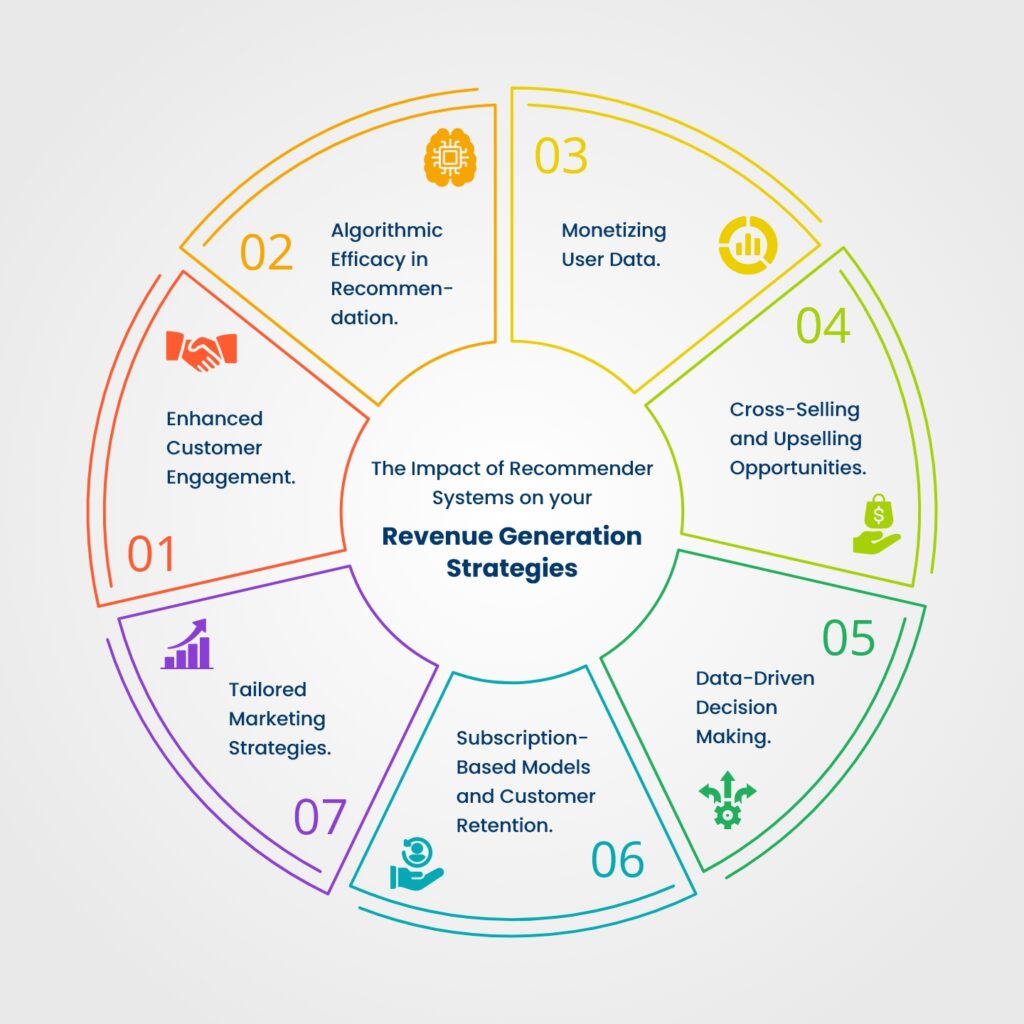Businesses, nowadays, are increasingly relying on advanced technologies to enhance their revenue generation strategies. Amid these technologies, recommender systems have emerged as powerful tools that not only improve customer experience but also significantly impact the bottom line. These systems leverage predictive modeling and customer insights to provide personalized recommendations, significantly impacting the way businesses attract and retain customers. Likewise, research says, the recommendation system and its field is expected to reach USD 15.13 billion by 2026, while it was valued at USD 2.12 billion in 2020, registering a CAGR of 37.46% during the period of 2021-2026. So, in this article, we will delve into the profound influence of recommender systems on revenue generation strategies, exploring how businesses can harness their potential to maximize profits.
Understanding Recommender Systems:
Recommender systems, often powered by artificial intelligence and machine learning algorithms, analyze user behavior, preferences, and historical data to provide personalized recommendations. These systems have become ubiquitous in online platforms, from e-commerce and streaming services to social media and content websites. By understanding user preferences and predicting their needs, recommender systems play a pivotal role in shaping consumer decisions and driving engagement.

Enhanced Customer Engagement:
One of the primary ways recommender systems contribute to revenue generation strategies is by enhancing customer engagement. When users are presented with personalized and relevant recommendations, they are more likely to stay on a platform, explore additional products or services, and make purchases. This increased engagement translates directly into higher conversion rates and, consequently, improved revenue streams. For instance, a study by Monetate set out to quantify the sales impact on product recommendations. They compared shoppers who saw a recommendation but didn’t engage with those who engaged with a recommendation. The research found that shoppers who engaged with a recommended product had a 70% higher conversion rate during that session.
Tailored Marketing Strategies:
Recommender systems empower businesses to craft tailored marketing strategies that resonate with individual preferences. In the paper titled “The Netflix Recommender System: Algorithms, Business Value, and Innovation” written by Netflix executives (Carlos A. Gomez-Uribe and Neil Hunt) state that the recommendation system saves the company around $1 billion each year. By leveraging user data, these systems enable targeted advertising, personalized promotions, and product recommendations. The result is a more efficient allocation of resources, ensuring that marketing efforts are directed towards audiences with a higher likelihood of conversion. This precision in targeting significantly optimizes the return on investment for marketing expenditures, a key component of successful revenue generation strategies.
Algorithmic Efficacy in Recommendation:
At the core of recommender systems lies sophisticated algorithms that fuel their recommendation engines. According to Spotify, the implementation of the new recommendation algorithm has helped increase their number of monthly users from 75 million to 100 million. Collaborative filtering, content-based filtering, and hybrid models are among the techniques employed to sift through vast datasets and predict user preferences accurately. The prowess of these algorithms enables businesses to position products or content strategically, optimizing the likelihood of conversion. As these algorithms evolve with continuous learning, their ability to deliver precise recommendations grows, ensuring sustained impact on revenue generation strategies.
Monetizing User Data:
Recommender systems, by design, thrive on data. The user data amassed through interactions provides invaluable insights into consumer behavior, preferences, and trends. Businesses can monetize this data by leveraging it for targeted advertising, refining marketing strategies, and even selling anonymized datasets to third parties. This dual benefit of enhancing user experiences and capitalizing on data-driven insights underscores the multifaceted impact of recommender systems on revenue generation.
Cross-Selling and Upselling Opportunities:
Recommender systems excel at identifying cross-selling and upselling opportunities. Through intelligent analysis of customer behavior, these systems can suggest complementary products or upgrades that align with the user’s interests and previous purchases. This not only increases the average transaction value but also fosters a sense of satisfaction and loyalty among customers. Integrating recommender systems into sales channels opens up new avenues for maximizing revenue generation strategies by tapping into the potential of upselling and cross-selling.
Subscription-Based Models and Customer Retention:
For businesses operating on subscription-based models, recommender systems play a crucial role in customer retention. By continuously analyzing user preferences and adapting recommendations, these systems ensure that subscribers receive content or services that align with their evolving interests. This personalized approach not only reduces churn rates but also encourages customers to renew or upgrade their subscriptions. For businesses dependent on recurring revenue, the implementation of recommender systems becomes integral to sustaining and growing their revenue streams.
Data-Driven Decision Making:
An often overlooked but critical aspect of revenue generation strategies is the valuable insights gained through data-driven decision making facilitated by recommender systems. By analyzing user behavior and preferences, businesses can make informed decisions about product development, inventory management, pricing strategies, and more. This data-driven approach ensures that resources are allocated efficiently, leading to improved profitability and a competitive edge in the market.
Takeaway
In conclusion, the integration of recommender systems into revenue generation strategies has become a game-changer for businesses in the digital era. These systems not only enhance customer engagement but also enable personalized marketing, identify up-selling opportunities, and contribute to customer retention. As businesses strive to maximize profits in an increasingly competitive landscape, leveraging the power of recommender systems has become a strategic imperative. By embracing this technology and incorporating it into their core strategies, businesses can unlock new avenues for revenue growth, ensuring a sustainable and prosperous future.


